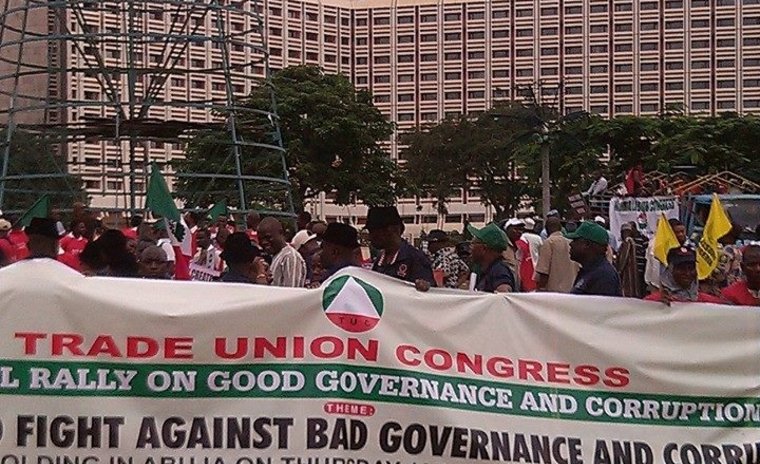
Credit: TUC Nigeria
As organizations become bigger and more relevant they become more attractive to labour unions who approach employees of organizations to join them. In Nigeria, joining a labour union as an employee is a right under the labour union act. It is a fact most organizations are fully aware of and try to avoid as much as possible. Despite this fact, some organizations have been able to avoid unions completely while others have a higher percentage of non unionized employees compared to unionized ones. We spoke to a few HR experts and they provided insight on how to avoid unions in your organization.
Have a strong HR department
The first step towards discouraging employees from joining a union is making sure you have a Human Resource team that is experienced and equipped to handle employee issues. This can be difficult for fast growing organizations who see their payroll balloon, within a short period of time. Your HR department must be close enough to employees and open enough to listen to their challenges. An open channel of communication must be available to deal with employee concerns. A responsive HR department is quick to identifying employee dissatisfaction and can quickly stop it from getting out of hand.
Employee Engagement
One of the major reasons why employees often end up joining unions is because they have no one to speak to when it comes to issues affecting their welfare. This makes them vulnerable and susceptible to labour unions. To avoid this, organizations have to provide multiple platforms for engaging employees. Employees should be able to engage their immediate supervisors, unit and departmental heads for issues that concern their welfare, career development and security. If an employee trusts his supervisor enough, there is little incentive to listen to someone else particularly a union member.
Attractive and competitive salaries
Salaries are probably the primary reason why people join unions. They want better pay and believe joining unions are their best chance of achieving their goals. Even though human wants are insatiable especially as it comes to salaries, organizations can mitigate this by offering competitive salaries that is within or above industry metrics. HR department of organizations must track what the competition is paying and advise management from time to time. Employees must also be informed frequently about how competitive their salaries are compared to industry peers. This is an important communication link that must be bridged.
Provide allowances and benefits
Allowances and benefits are an essential part of having a competitive welfare policy. Apart from salaries, employees typically recognize other benefits, such as health insurance, transportation, tea and breakfast as important reasons why they remain in organizations. In the same vein, an absence of these benefits can lead to employees feeling aggrieved and vulnerable to labour unions. Benefits such as health insurance, death benefits, severance rank amongst the most important incentives that can discourage employees from getting unionized.
Have a disciplinary committee
A disciplinary committee in most organizations are responsible for dealing with issues bothering on discipline, fraud, malpractices etc. It is an opportunity to give employees a fair hearing during disciplinary issues. Even when we have this committee in place, it is important to ensure that they are fair when dealing with issues and stick to its procedures and guidelines. Once employees see DCs as kangaroo courts they get encouraged to seek redress elsewhere.
Encourage Promotion
Lack of promotion or a clear career path in most organizations is also one of the many reasons why employees join labour unions. When people work for years and don’t get promoted they feel aggrieved and look for avenues where they can be heard start to look for people to fight for them. To avoid this, ensure that you have a career development path for employees and let them know what is there for them to aspire to. Let them know in clear terms, how and when they will be promoted. When employees are not qualified to be promoted they should be duly notified and encouraged to work harder.
Do not discriminate
Employee discrimination and nepotism also lead to dissatisfaction among employees making them seek the help of labour unions. Discrimination at work places could involve compensating a few people more than others and giving them a better working condition. Nepotism on the other hand involves favoring people of a different tribe or region or race over others when it comes to hiring, firing or promotions.
Indiscriminate firing
Indiscriminate firing of employees should be avoided by all means especially when it has to do with mundane issues that can be handled by disciplinary committees. Employee are jealous of their job security and feel very insecure when they see their colleagues getting fired for flimsy reasons. Try to avoid this as much as possible and only fire people in line with your disciplinary matrix or for economic reasons.
Reward loyalty
Loyalty is hard to find in the working place and when available must be rewarded. Long service awards, disengagements benefits are examples of rewards employees can get for being loyal. Newer employees observe how older employees are treated and start to worry that it could be them next.
Be cautious unofficial associations
Freedom of association is an important right employees have and should be encouraged. However, it is important to apply caution when it comes to such associations as they can more often than not gravitate into unions. The HR department should closely watch the activities of such associations and try to limit it to non union activities.






